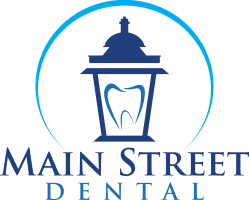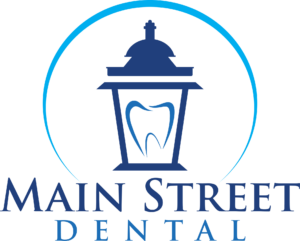TMJ/TMD Therapy
We frequently think of our teeth and tongue as the major components when it comes to our capacity for speaking, laughing, and chewing. What about the jaw, though? Your jaw’s temporomandibular joint (TMJ) may become inflamed and painful. In addition to being uncomfortable, it might make it difficult for you to enjoy life. That’s why our team at Main Street Dental offers TMJ treatment in North Baltimore, OH.
What is TMJ/TMD?
The terms temporomandibular joint and temporomandibular joint dysfunction are referred to by the abbreviations TMJ and TMD. The temporomandibular joint, situated on either side of the face just below the ear, can become injured or inflamed, leading to TMD. This sensitive joint joins the jaw to the skull and is susceptible to injury, inflammation, and pain. At Main Street Dental, we provide many TMJ treatments that ease discomfort, realign the jaw, and safeguard the temporomandibular joint’s delicate functionality.
Symptoms of TMD
Knowing the symptoms of TMJ dysfunction is essential so we can treat your condition quickly and conservatively. When you visit Dr. Michael O’Neill and Dr. Emily Spetka for your subsequent dental examination, let them know if you’re experiencing any minor symptoms. In addition to jaw pain, TMJ can result in many other symptoms:
- Pain and tenderness of the jaw
- Pain and tenderness in one or both temporomandibular joints
- Lockjaw
- Painful headaches
- Clicking sounds when you open your mouth
- Soreness, stiffness, and tension in your jaw, neck, and shoulders
- Earache pain
- Uneven movement of the jaw
- Difficulty chewing or swallowing
- Jaw dislocation when your mouth is open
- Clenching teeth during sleep
- Worn or cracked teeth
What Causes TMJ/TMD?
The temporomandibular joint’s cartilage maintains the smooth motion of the joint’s hinge-and-slide function. The joint’s disc, which serves as a shock absorber and helps with mobility, is located in the space between its bones. TMJ symptoms might develop when that cartilage or disc is harmed or inflamed. Before a treatment strategy is implemented, it’s crucial to allow Dr. O’Neill or Dr. Spetka to make an appropriate diagnosis. Some causes of TMJ/TMD include:
- The shock-absorbing disc is eroding
- The disc deviates from its alignment
- Arthritis has harmed the cartilage
- The joint is harmed by trauma or impact.
- Chronic tooth grinding or clenching
- Chronic tooth grinding or clenching
- Connective tissue disorders that harm joint tissues
- Missing teeth or an unaligned bite
- Stress
TMJ Treatments
Dr. O’Neill and Dr. Spetka have undertaken rigorous continuing education courses to understand TMJ issues better and how to treat them. Through his education, he developed unique expertise and comprehension of how this joint functions to provide therapies. We will perform a thorough oral examination to check for TMJ issues. To diagnose TMD and look for indications of temporomandibular joint inflammation, we will take x-rays of your face and jaw. Some of the treatments we might suggest include:
Rest and Therapy: Rest or physical therapy for the joint can help you feel better if your jaw pain is brought on by something like eating particular foods. The TMJ can heal by avoiding hard, crunchy foods and bubble gum. Additionally, you could massage the region or use a hot, wet towel or cold compress.
Night Guard: You can wear a custom-made mouthguard, also known as an occlusal guard or night guard since jaw clenching and teeth grinding frequently and unintentionally occur while you sleep. To prevent your TMJ pain from getting worse and further harming your teeth, this is an excellent strategy to keep your upper and lower teeth apart while you’re sleeping. An occlusal guard acts as a shock absorber between your upper and lower teeth to prevent your teeth from clenching and grinding. This shock-absorbing technique lessens the force that teeth-clenching and -grinding exert on the jaw, which can diminish TMJ symptoms.
Botox: Although Botox injections are most famous for their ability to eliminate wrinkles, Botox Dental Therapy may treat painful issues brought on by the jaw muscles. TMJ disorders, bruxism, and teeth clenching can all result in excruciating pain and headaches. Fortunately, Botox, which helps relax the muscles surrounding the mouth and jaw, can successfully and affordably address the majority of these issues.
Bite Alignment Treatment: You can also benefit from other relief methods, such as bite alignment treatment. Bite alignment treatment makes it easier for your upper and lower teeth to line up correctly when biting down. Dental implants to replace missing teeth, orthodontics to treat malocclusions, and other procedures could ease jaw pain and reduce stress.
TMJ Treatment in North Baltimore, OH
It is never a good idea to ignore pain because it is your body’s warning that something isn’t right. We advise you to err on the side of caution and schedule an appointment if you have muscle tension, tenderness, or other symptoms.
Your TMJ pain will probably get worse if it isn’t properly diagnosed and treated. Dr. Michael O’Neill, Dr. Emily Spetka, and our staff can efficiently treat your jaw discomfort and stiffness at Main Street Dental by determining the root of the problem and eliminating it, allowing you to resume enjoying life.
Schedule a consultation today to get relief from your TMJ.

